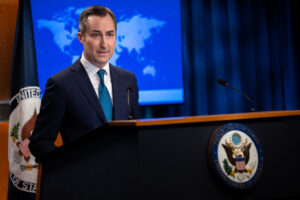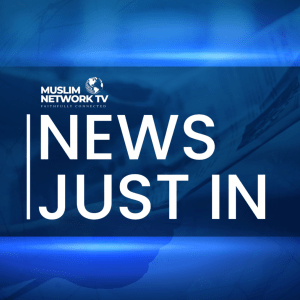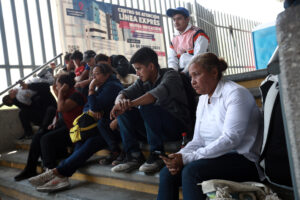Chad ruler Deby says unity govt ‘in next few days’
N’Djamena, Chad (AFP):
Chad’s ruler Mahamat Idriss Deby Itno has said that a “government of national union” would be created in the coming days to steer the course toward new elections following a forum on the country’s future.
The government “will put its heart and soul into ensuring that the will of the Chadian people is fully upheld,” said Deby at ceremonies where he was appointed “transitional president” after the forum ended.
Chad, one of the world’s poorest countries, has endured repeated uprisings and unrest since gaining independence from France in 1960.
Deby, a 38-year-old five-star general, took the helm in April 2021 after his father, Idriss Deby Itno, who had ruled with an iron fist for three decades, was killed during an operation against rebels.
The parliament was dissolved and the constitution suspended as Deby was proclaimed president.
He headed a junta of 15 generals whose declared plan was to hand over power after 18 months — a period that without extension would have ended this month.
Deby then organised a “national inclusive dialogue” that he said would chart the country’s return to civilian rule.
It wound up on October 8 after endorsing a further two-year period leading to elections during which Deby would become “transitional president” and be allowed to stand as a candidate in the future polls.
The conference opened on August 20 after repeated delays but was boycotted by the main political opposition and two out of the three biggest armed rebel groups.
Promising “democratic” elections, Deby said the new government would be formed “in the next few days… (ahead of) the second phase of transition.”
This phase should lead to “the strengthening of our democracy,” he said.
“Elections will be held, transparently and peacefully, to enable the men and women of Chad to put an end to the transition and ensure the return to constitutional order,” he said.
Deby had initially pledged an 18-month transition period and said he would not run in the presidential elections.
But in June 2021, he floated the possibility of extending the transition by a further 18 months “if the Chadians do not manage to reach an agreement” on the way forward.
He also said he would leave the question of his presidential candidacy to God.
Deby, usually seen in military regalia, appeared for his swearing-in in a traditional long white gown.
AU stays away
VIPs who attended the inauguration included Nigerian President Muhammadu Buhari and ministers from Niger, the Central African Republic and Democratic Republic of Congo.
France, the former colonial power and long-term ally of Deby’s father, was represented by its ambassador, as was the European Union (EU).
But there was notably no representative from the African Union (AU).
On September 19, the continent-wide bloc had urged the junta not to extend its stay in power beyond the initial 18 months.
It also said “unequivocally that no member of the Transitional Military Council (the junta) may be a candidate for the elections at the end of the transition.”
The AU did not comment on its absence.
In his speech, Deby urged the international community “to support Chad in its ongoing quest for security and stability, both inside and outside its borders, notably in the theatres of peacekeeping operations and fighting terrorism.”
France and other western countries consider Chad, which has a relatively well-equipped and well-trained army, to be a linchpin in efforts to combat insurgencies by militant groups claiming allegiance to Islamic politics in the Sahel region.
The West has largely muted criticism of the military takeover, in a region where coups in Guinea, Burkina Faso and Mali have sparked a clamour for a swift return to civilian rule.
Enrica Picco of the International Crisis Group (ICG) think tank said the junta had been formally dissolved as a result of the forum, which meant Deby’s powers would be “widened and extended” as transitional president, enabling him to directly determine key appointments such as that of the prime minister.
Many Chadians seemed doubtful about much change or said basic issues took precedence.
“Deby has to improve his way of running things. It’s the same system that his father had,” said Hissein Adam, a storekeeper in N’Djamena.
“We want him to build roads, invest in agriculture and stock-breeding and give a special place for education, because there is no development if you don’t promote education,” said Halime Ibrahim, a man aged in his sixties.









